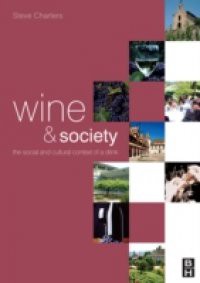Wine is becoming increasingly popular in the Anglophone world and there are many books available which describe how and where it is made. However, none address the fundamental questions of different structures of production and how the consumer relates to the product - this book is the first to do just that.Wine and Society: the cultural and social context of wine production and consumption looks at the relationship between wine production and marketing, focussing in consumer behaviour and cultural attitudes. Divided into four parts, it examines the context of wine production, the wine consumer and the social context of wine, discussing the following themes:* That the core of wine production and consumption is shaped by historical, geographical and cultural factors.* Wine production - European and new world looking at the different kinds of producer and how the varying background of each shapes their perspective on what they produce* Terroir and appellations: why demarcation and sense of place became important, how they are used to achieve marketing differentiation, and the 'benefits' (or otherwise) to the customer.* The contemporary wine consumer and lifestyle factors - looking at wine clubs, tourism, education, culture and literature* The politics and economics of wine - from supporting rural industries in France to protecting customers from deception and health risks.Suitable for third year and post-graduate students of hospitality, wine (both in production and marketing), wine tourism, gastronomy and related courses, it encourages students to think critically about the issues raised by using real life case studies and examples from around the world, also including press releases and marketing campaigns.* Examines the relationship of wine to the cultures which produce and consume it, the meaning of wine consumption and its impact on society and lifestyles.* Looks behind the marketing of wine, and reveals what hidden messages are contained in wine advertising. * Uses a wide framework, exploring how these issues have been shaped by the past, and how they exist in different ways around the world, encouraging analysis and reflection.

